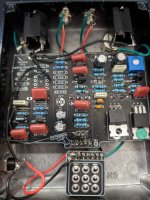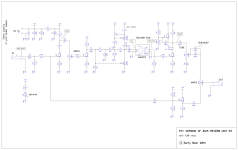Brandalones
New member
I just finished a build of the Griffin Effects Ricochet (https://griffineffects.com/byo-pcbs/modulation/ricochet-pcb) using the original mixer, and am getting power and signal in both bypassed and on positions, but when on, I don't get any reverb, only like a fuzz when dialed wet. No crash sound if I shake the springs either. I had the TP1 getting voltage at about 6.6 after adjusting R13. I also read on another post that someone tried removing Q3 - BC557B so I also did that. No real change.
Any ideas what else could be the issue? My only thought is maybe one of the MOSFETS are fried, but I am getting voltage readings on both of them. I don't know what they should be reading at each pin though.
View attachment 72244
Any ideas what else could be the issue? My only thought is maybe one of the MOSFETS are fried, but I am getting voltage readings on both of them. I don't know what they should be reading at each pin though.
View attachment 72244



